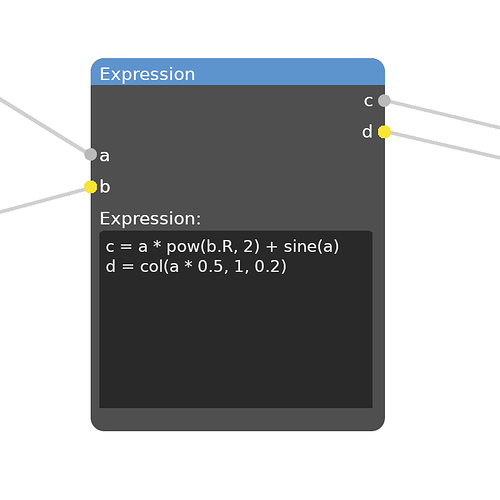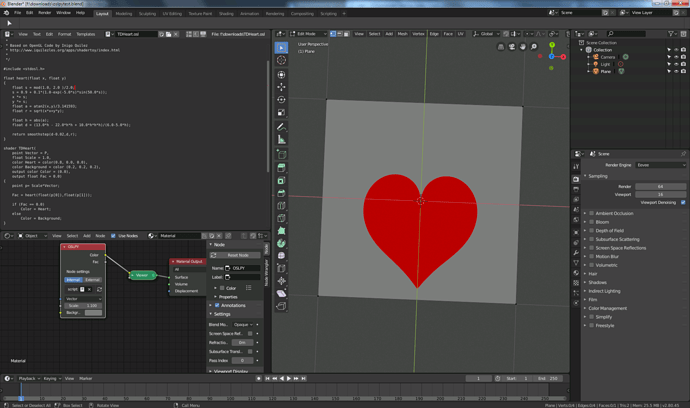It isn’t “yet” being worked on? Could it be considered before 2020?
I posted this in this GSoC Project - but as Brecht pointed out, it’s way too much work for that - maybe at some point it can be picked up, so I just copy-paste it here:
The ability to create your own expressions
This could be a Node that allows text input and the creation of your own in- and outputs. You could then input for example:
outputA = inputA * pow(inputB, 2) + 1
This would of course be restricted to the existing Math operations. This way instead of creating huge networks of Math Nodes, a single Node with an expression would be enough.
Adding in and Outputs could work like it currently works with NodeGroups - in the Sidebar (with your additional functionality to controll the type).
An Example would be Rendermans PxrSeExpr
as mentioned previously, you can already do this with OSL, and if you stick to basic equations oslpy will even make them run on the gpu.
Sure, you can do everything with OSL. But this would be more handy and accessible. I’m not proposing to make this Node compile complex OSL - just basic expressions.
I have an update for oslpy that’ll make it work with eeve/2.8 just need to find some time to finish it.
But the “bad” part of OSL is that, at least in the past, it made Cycles slower and it was only supported under CPU, no GPU support, for OSL to be really widely used and available I think GPU support has to be implemented, and render times with OSL need to be optimized, just my 2 cents 
OSLPY makes it run on the cpu and gpu without having to have the osl checkbox checked, there’s no slowdowns.
Oh! What? awesome!
And is that already implemented in master?
I mean… can we use OSL with GPU already by default?
Then, the OSL checkbox… shouldn’t be removed?
it’s an addon, doesn’t ship with stock blender. more info here
no 2.8 compatible version?
And it seems it’s yours!  , you don’t want it to be included in Blender? (as an included addon I mean)
, you don’t want it to be included in Blender? (as an included addon I mean)
Cheers!
I have a 2.80 version that’ll work with both eeve and cycles, just need to find some time/motivation to finish up tying up some loose ends
Ooh, I see, I also read that it’s not full OSL, just part of it, but noise generators and other things are not supported, it’s a pity, in the end we need proper OSL support to have it production ready 
nvidia is working on osl on the gpu, but i think it’s currently only supported with optiX, intel is working on batch shading on the cpu which should speed things along as well. afaik there is no indication if/when either of those projects will make it to mainline OSL.
Let’s hope sooner than later 
Hi, its been a while since my last visit.
Regarding improving Cycles…there is one thing that bothers me (actually two  )
)
-
Missing P and Pref pass AOV output by default (I know you can use workaround but not in single render pass/viewlayer) * would be awesome to have that checker to render it or not in Passes tab
-
Right now there is big limitation for outputting rendered images using main render tab…when rendering out multiple viewlayers and AOVs…the compositor “file output” node workflow is not ideal and efficient.
Right now it seems the preferred way is to use multilayer EXR to write all layers/aovs but its not best when need to do redos…better to have single layered EXRs like mutliple sequences and overdo just some of them (u can do so using that composite nodes but…)
Not sure if its a Cycles thing or not but would be cool to have option to insert tokens into filename in main render tab for ie “scenename” “viewlayer” “AOV” so blender would output separate files named automatically after scene and viewlayers and passes which were chosen to render.
myscene_viewlayer1_dirDiffuse.exr …you know what I mean
Would be much more versatile and easy to setup…basically, gasp, gasp, …“maya like” style
Cheers! And thanks for all the work you doing guys!
While using the Rendered shading mode in the 3d view, everytime you orbit or update something, instead of instantly showing the updated Cycles rerender, the slowly transitions/fades to the Cycles render from the Lookdev or Solid in the span of some secods. I think I’ve seen something similar to this in MagicaVoxel.
If I read you well, I like the idea, and it’s always something that I was asking myself: now each render starts from scratch, I assume a 0,0,0 black color for every pixel and then the samples add on that with some sort of averaging (it’s rough I know). What if sample #0 is not black but a LookDev or Eevee full render?
That’s a pretty intereseting concept!
it may generate problems depending on how pixels are added if there are differences between the specularity of one and another, but it could be a good idea, maybe limiting the base render to something basic, like just the albedo + some other pass.
It’ s pretty interesting
It’s just a castle in the air, I’m sure @brecht can dismantle it with reasons in less than 10 words… 
Crazier things led out to feasible ideas  so no idea is a bad idea as long as it’s not the final idea
so no idea is a bad idea as long as it’s not the final idea 

